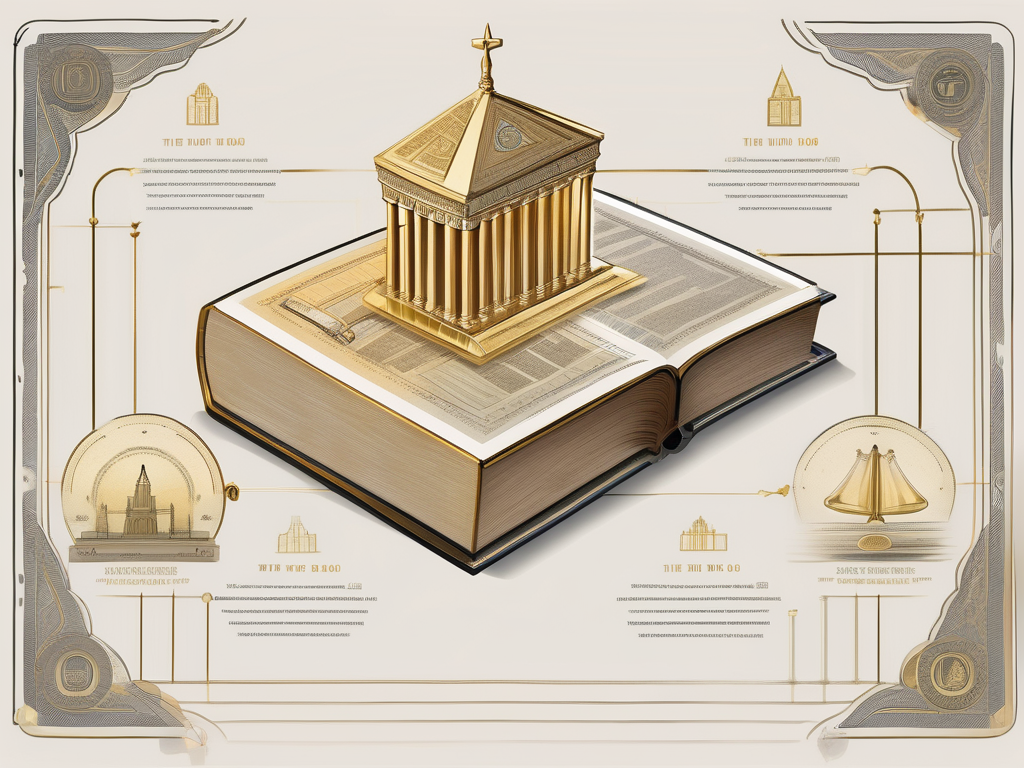Mormonism, also known as The Church of Jesus Christ of Latter-day Saints (LDS Church), is a religion that has gained worldwide attention due to its distinctive traits and beliefs. In this article, we will delve into the foundations and key elements that set Mormonism apart from other religious practices.
Understanding the Foundations of Mormonism
Mormonism has a rich history and unique origins that shape its identity today. It all began in the early 19th century when Joseph Smith, a young man living in upstate New York, claimed to have received divine revelations. These revelations ultimately led to the establishment of the Mormon faith and the publishing of the Book of Mormon.
The Origins and History of Mormonism
The roots of Mormonism can be traced back to Joseph Smith’s alleged encounter with the angel Moroni, who guided him to an ancient record engraved on golden plates. Smith translated these plates and published the Book of Mormon, which Mormons believe to be an additional testament of Jesus Christ, alongside the Bible.
Joseph Smith’s encounter with the angel Moroni is a fascinating story in itself. According to Smith’s account, Moroni appeared to him multiple times over the course of several years, instructing him about the existence of the golden plates and their significance. These encounters were not only spiritually profound for Smith but also marked the beginning of a new religious movement that would have a lasting impact on American history.
Following the publication of the Book of Mormon, Smith organized the Church in 1830, starting in New York and later relocating to Ohio, Missouri, and Illinois. However, due to conflicts with local governments and persecution, the Mormons eventually settled in Utah, where they established Salt Lake City as their headquarters in 1847.
The journey of the early Mormons from New York to Utah is a tale of resilience and determination. Faced with numerous challenges and hardships along the way, they persevered and sought a place where they could freely practice their faith. Their arrival in Utah marked a turning point in the history of Mormonism, as they established a thriving community that would become the center of the faith.
Key Beliefs and Teachings of Mormonism
Central to Mormonism is the belief in ongoing revelation. Mormons regard Joseph Smith and subsequent prophets as divinely chosen individuals who receive direct guidance from God to lead the Church and provide new teachings. This belief in modern-day prophets sets Mormonism apart from other Christian denominations.
The idea of ongoing revelation is not limited to the early days of Mormonism. Mormons believe that revelation continues to this day, with each prophet receiving guidance and inspiration for the Church and its members. This belief in ongoing revelation ensures that the Mormon faith remains dynamic and adaptable to the changing needs of its followers.
Mormons also have a unique perspective on the nature of Godhead. They believe that God the Father, Jesus Christ, and the Holy Ghost are three distinct beings, rather than a single unified entity. This concept challenges the traditional Christian view of the Holy Trinity.
The Mormon concept of the Godhead opens up a world of theological exploration and contemplation. It invites believers to ponder the complexities of divine nature and the relationship between the Father, the Son, and the Holy Ghost. This unique perspective on the Godhead has sparked countless discussions and debates among theologians and scholars.
The Mormon concept of salvation goes beyond faith in Jesus Christ alone. They emphasize the importance of good works, obedience to commandments, and participating in sacred temple rituals to achieve exaltation and become gods and goddesses in the afterlife.
The idea of becoming gods and goddesses in the afterlife is a concept that sets Mormonism apart from many other Christian denominations. It reflects the belief in eternal progression, the idea that humans have the potential to continue learning, growing, and developing throughout eternity. This belief in eternal progression offers a profound sense of hope and purpose for Mormons, as they strive to live according to their faith and fulfill their divine potential.
The Role of Prophets in Mormonism
In Mormonism, prophets hold a crucial role in guiding the Church and its members. They are seen as the mouthpieces of God, receiving divine revelations for the benefit of the entire Mormon community.
Prophets in Mormonism are not merely historical figures from the past, but rather an ongoing presence in the Church. They are regarded as spiritual leaders who provide guidance, direction, and inspiration to the faithful. The role of prophets is deeply rooted in the belief that God continues to communicate with His children in the present day.
These prophets are not chosen by human vote or appointment, but rather through a process of divine inspiration. It is believed that God Himself selects and calls individuals to serve as prophets, ensuring that they are equipped with the necessary spiritual gifts and authority to fulfill their sacred responsibilities.
The Concept of Living Prophets
Mormons believe that the prophetic authority did not end with Joseph Smith but has continued throughout the generations. They believe in the succession of prophets, with the current President of the Church regarded as the living prophet on the Earth today.
The concept of living prophets is central to the Mormon faith. It is believed that these prophets are not only called to guide the Church but also to receive ongoing revelation from God. This means that they have the ability to receive divine insight and guidance specific to the needs of the Church and its members in the present time.
The role of living prophets is seen as a source of stability and continuity in the ever-changing world. They are seen as a direct link between God and His people, providing them with spiritual nourishment and direction in an increasingly complex and challenging world.
Furthermore, Mormons believe that the teachings and revelations received by living prophets are binding and authoritative. These teachings are considered to be the word of God and are expected to be followed by faithful members of the Church.
The Influence of Prophets on Mormon Doctrine
Mormon prophets have had a significant influence on the development of Mormon doctrine. They have introduced new teachings, clarified existing principles, and provided guidance on various issues affecting the Church and its membership. This continuous revelation ensures that Mormonism remains a dynamic and evolving faith.
Throughout the history of Mormonism, prophets have played a vital role in shaping the beliefs and practices of the Church. They have received revelations that have expanded the understanding of God, Jesus Christ, and the purpose of life. These revelations have been recorded in sacred texts such as the Book of Mormon, the Doctrine and Covenants, and the Pearl of Great Price.
Prophets have also addressed social and moral issues, providing guidance on topics such as marriage and family, education, and the importance of service. Their teachings have helped to establish a strong moral foundation within the Mormon community and have provided a framework for personal and collective growth.
It is important to note that while prophets are seen as inspired and authoritative, they are not infallible. Mormons believe that prophets are human beings who are subject to their own weaknesses and limitations. However, it is believed that when acting as prophets, they are guided and protected by the power of God.
In conclusion, prophets hold a central and revered role in Mormonism. They are seen as the mouthpieces of God, providing ongoing revelation and guidance to the Church and its members. The concept of living prophets ensures that Mormonism remains a vibrant and evolving faith, capable of addressing the needs and challenges of the modern world.
Mormonism’s Sacred Texts and Their Significance
Mormonism, also known as The Church of Jesus Christ of Latter-day Saints, places great emphasis on sacred texts. These texts carry unique significance within the faith and contribute to its distinctive teachings and practices. The Mormons believe that these texts are not only historical records but also divine revelations that guide their spiritual journey.
The Book of Mormon: Another Testament of Jesus Christ
One of the most important sacred texts in Mormonism is the Book of Mormon. Considered by Mormons as a companion to the Bible, it tells the story of ancient civilizations in the Americas and the appearance of Jesus Christ after his resurrection. The Book of Mormon is viewed as an additional witness of Jesus Christ’s divinity and a testament to the restoration of the true Church.
- The Book of Mormon is comprised of multiple books, including the teachings of ancient prophets such as Lehi, Nephi, and Alma. These prophets, according to Mormon belief, received divine revelations and guidance to lead their people.
- Mormons believe that by studying and following the Book of Mormon’s teachings, individuals can receive spiritual guidance and draw closer to God. The book contains principles of faith, repentance, baptism, and the gift of the Holy Ghost, which are central to Mormon doctrine.
- Furthermore, the Book of Mormon provides insights into the nature of God, the plan of salvation, and the importance of family and community. It teaches principles of charity, forgiveness, and the pursuit of personal righteousness.
Other Important Texts in Mormonism
Besides the Book of Mormon, Mormons also value other writings and teachings that contribute to their understanding of God’s plan and their purpose in life. These texts include the Doctrine and Covenants and the Pearl of Great Price.
- The Doctrine and Covenants is a collection of revelations received by Joseph Smith, the founder of Mormonism. It provides insight into matters of governance, priesthood authority, and various ordinances practiced in Mormonism. It contains revelations given to Joseph Smith and subsequent prophets, addressing the organization and administration of the Church.
- The Pearl of Great Price includes translations of ancient documents, such as the Book of Abraham, which Mormons consider to be sacred and inspired. It also contains Joseph Smith’s translation of parts of the Bible, known as the Joseph Smith Translation or the Inspired Version.
- Within the Pearl of Great Price, there is also the Book of Moses, which provides an expanded account of the Creation and the early history of the world. It offers insights into the nature of God, the Fall of Adam and Eve, and the plan of salvation.
These sacred texts, including the Book of Mormon, the Doctrine and Covenants, and the Pearl of Great Price, are not only revered by Mormons but also studied and pondered upon as a means to gain spiritual knowledge, guidance, and personal revelation. They form the foundation of Mormon beliefs and practices, shaping the lives of its followers and providing a framework for their relationship with God and their fellow human beings.
The Mormon Concept of Godhead
The Mormon understanding of the Godhead differs from traditional Christian perspectives, presenting a unique interpretation of deity.
Understanding the Mormon View of God
Mormons believe in an eternal progression, suggesting that God the Father was once a mortal being who achieved godhood through obedience to eternal principles. They believe that humans can similarly progress to become like God by faithfully adhering to God’s commandments.
Mormons view God the Father as a personal and loving being who is actively involved in the lives of his children, offering guidance and support through prayer and personal revelation.
The Role of Jesus Christ and the Holy Ghost in Mormonism
Mormons revere Jesus Christ as the divine Son of God and the Savior of humankind. They believe in his atoning sacrifice and that through his grace, repentance, and obedience to commandments, individuals can be saved and redeemed.
The Holy Ghost, according to Mormonism, acts as a comforter, providing personal revelation and spiritual guidance to individuals who seek truth and adhere to the teachings of Jesus Christ.
The Importance of Temples in Mormonism
Mormon temples hold a central role in the faith, representing a unique aspect of Mormon worship and spiritual practice.
The Purpose and Functions of Mormon Temples
Mormon temples are seen as places where individuals can make sacred covenants with God through various ordinances, including baptisms for the dead, marriage ceremonies, and other rites aimed at strengthening family relationships and eternal connections.
Temples are also regarded as houses of prayer, contemplation, and spiritual renewal, providing a place for individuals to seek solace, guidance, and divine intervention.
Temple Rituals and Ordinances
The rituals and ordinances conducted in Mormon temples are considered sacred and confidential. They involve symbolic acts and ceremonies that strengthen individual faith and commitment to the principles of Mormonism.
These ordinances include endowments, sealings, and baptisms for deceased ancestors. Mormons believe that by participating in these sacred rituals, individuals can not only bless their own lives but also assist in the salvation and progression of their ancestors.
As we have explored, Mormonism showcases distinctive traits that set it apart from other religious practices. The foundations, beliefs, and practices of Mormonism provide its members with a unique spiritual framework, emphasizing the importance of revelation, temples, and the eternal progression of the soul. Whether one agrees or disagrees with these distinctive traits, understanding the foundations and key elements of Mormonism contributes to a more comprehensive grasp of this fascinating faith.












